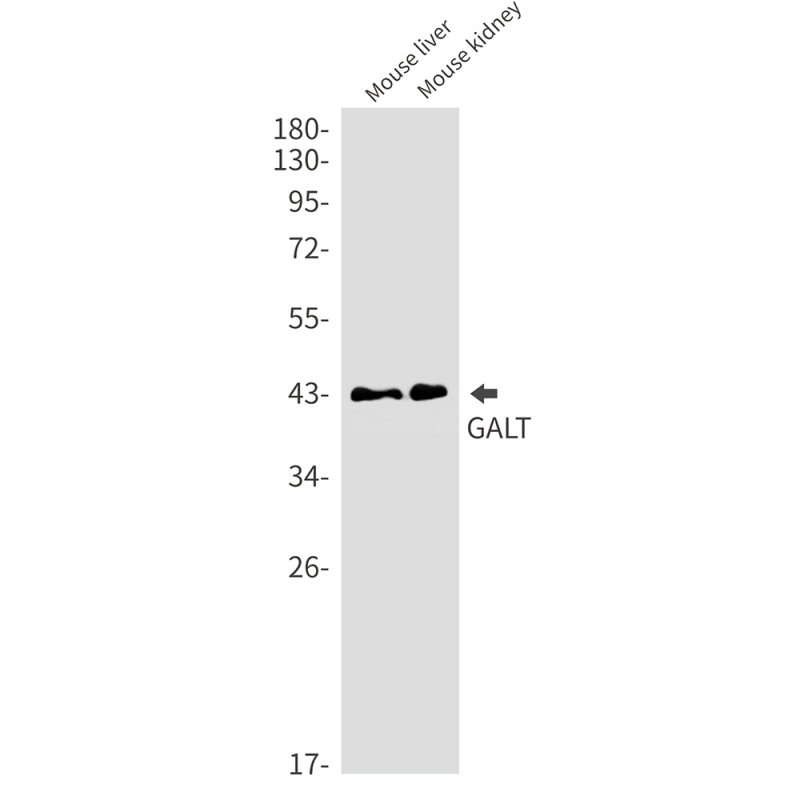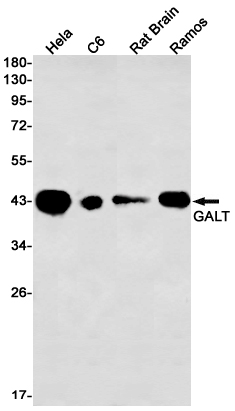

| WB | 1/500-1/1000 | Human,Mouse,Rat |
| IF | 1/20 | Human,Mouse,Rat |
| IHC | 咨询技术 | Human,Mouse,Rat |
| ICC | 技术咨询 | Human,Mouse,Rat |
| FCM | 咨询技术 | Human,Mouse,Rat |
| Elisa | 咨询技术 | Human,Mouse,Rat |
| Aliases | Gal-1-P uridylyltransferase; UDP-glucose--hexose-1-phosphate uridylyltransferase |
| Entrez GeneID | 2592 |
| WB Predicted band size | Calculated MW: 43 kDa; Observed MW: 43 kDa |
| Host/Isotype | Rabbit IgG |
| Antibody Type | Primary antibody |
| Storage | Store at 4°C short term. Aliquot and store at -20°C long term. Avoid freeze/thaw cycles. |
| Species Reactivity | Human,Mouse,Rat |
| Immunogen | A synthetic peptide of human GALT |
| Formulation | Purified antibody in TBS with 0.05% sodium azide,0.05%BSA and 50% glycerol. |
+ +
以下是关于GALT抗体的3篇参考文献,涵盖酶功能研究和免疫学方向:
---
1. **文献名称**:*"Immunochemical Characterization of Human Galactose-1-Phosphate Uridylyltransferase Using Monoclonal Antibodies"*
**作者**:Fridovich-Keil, J.L., et al.
**摘要**:研究通过制备单克隆抗体分析GALT酶的结构和功能,揭示其在不同半乳糖血症患者中的活性缺失机制,为酶缺陷诊断提供工具。
2. **文献名称**:*"Molecular Basis of Classic Galactosemia: Role of GALT Mutations in Enzyme Dysfunction"*
**作者**:Berry, G.T., et al.
**摘要**:综述GALT基因突变对酶活性的影响,利用抗体检测技术揭示突变导致的蛋白表达异常,推动精准诊断方法的发展。
3. **文献名称**:*"Mucosal IgA Antibody Production in Gut-Associated Lymphoid Tissue: Regulation and Function"*
**作者**:Corthésy, B., et al.
**摘要**:探讨肠道相关淋巴组织(GALT)中IgA抗体的生成机制,及其在黏膜免疫防御中的作用,为口服疫苗设计提供理论依据。
---
**备注**:上述文献方向涵盖代谢疾病(半乳糖血症)中GALT酶的抗体应用,以及免疫学中GALT组织的抗体应答研究。如需具体文献来源或更新研究,可进一步提供数据库检索支持。
GALT (galactose-1-phosphate uridylyltransferase) antibodies are primarily associated with the diagnosis and study of galactosemia, a rare inherited metabolic disorder caused by mutations in the *GALT* gene. This enzyme catalyzes a critical step in galactose metabolism, converting galactose-1-phosphate and UDP-glucose to glucose-1-phosphate and UDP-galactose. Deficient GALT activity leads to toxic accumulation of galactose metabolites, causing severe complications in infants, including liver dysfunction, neurological issues, and cataracts.
Anti-GALT antibodies are used in research and clinical settings to detect and quantify GALT protein levels, aiding in confirming galactosemia diagnoses, particularly in cases where enzyme activity assays are inconclusive. These antibodies are employed in techniques like Western blotting, immunohistochemistry, or ELISA to assess protein expression, localization, or stability. Additionally, they help characterize *GALT* gene variants’ functional impacts, distinguishing pathogenic mutations from benign polymorphisms.
While newborn screening for galactosemia typically measures enzyme activity or metabolite levels, GALT antibodies complement genetic testing by providing insights into protein-level defects. Their development has also facilitated studies on GALT’s structural biology and potential therapeutic strategies, such as chaperone therapy or gene editing. Both polyclonal and monoclonal antibodies are utilized, with specificity and sensitivity optimized for diverse experimental and diagnostic applications.
×